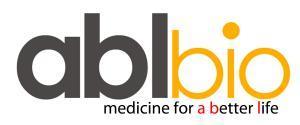ABL Bio said that it has presented its latest research result for ABL301, a bispecific antibody with indications for treating Parkinson's disease, at the Keystone symposium 2019 held in Colorado.

ABL301 is a bispecific antibody against alpha-synuclein, a protein that exists in the brain and is in charge of transmission of neurotransmitters and considered to be an essential factor in Parkinson's disease. Abnormal aggregation of alpha-synuclein is thought to be one of the major causes of Parkinson's disease.
"ABL301 is superior to conventional antibodies in the ability to cross the blood-brain barrier (BBB), which inhibits brain transmission of central nervous system drugs," the company said. "Currently, over 98 percent of drugs are known to have failed to pass through the BBB, regardless of their size, and the ability to pass through is considered to be a key to the success of the development of the chronic nervous system treatment."
During the conference, the company plans to present the excellent aggregation selectivity for the ABL301.
Data analysis of ABL301 showed favorable aggregation preference compared to competitor antibodies in clinical trials currently. These results suggest that ABL301 has superior efficacy against competing antibodies by selectively binding only to aggregates that cause Parkinson's disease, the company said in a press release.
The improved ability of ABL301 to pass through the BBB is through a form of BBB shuttle antibody conjugated to the therapeutic antibody.
ABL Bio plans to release this second generation BBB shuttle, which is significantly better than the first-generation BBB shuttle with improved BBB transitivity of the therapeutic antibody, at the symposium.
The company's bispecific antibody, coupled with the new BBB shuttle, has been shown to lower the alpha-synuclein protein in the brain than the alpha-synuclein monoclonal antibody when administered subcutaneously in a mouse model of Parkinson's disease.
"ABL301 will reach more of the disease target in the brain as it selectively binds to alpha-synuclein aggregates and has a superior ability to pass BBB compared to competitive antibodies," ABL Bio CEO Lee Sang-hoon said. "That will result in superior therapeutic efficacy compared to competitors’ antibodies."

